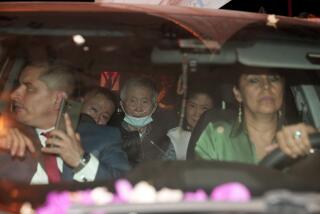Peru’s Coup
- Share via
Peru’s President Alberto Fujimori’s autogolpe (“self-coup”) can be compared with the acts of past dictators who came to power through election but ended up taking their nations and the rest of the world to unspeakable disasters and tragedies (“A Year Later, Peru’s Leader Defends Coup,” April 3).
Sadly, Peru’s situation before Fujimori was in an awful quagmire, from terrorism to its dysfunctional democracy, and everyone familiar with that country’s political state predicted something must happen. Clearly cure was badly needed but that the cure would involve dictatorial leadership came as a complete shocker.
Equally shocking was the ambivalence displayed by the United States and the Latin American states whose silence on Fujimori’s coup amounted to an approval for other dictators who might follow the same path to meet similar problems.
This also brings us to the current problem in Russia. Suppose Boris Yeltsin draws half the votes in the referendum on April 25, and decides to follow in the footsteps of Fujimori--what then? Of equal concern is the possibility that the Russian Parliament might stage a coup of its own if Russian voters said nay to Yeltsin.
For Russia’s untested democracy the true test now awaits for the president and the Parliament to learn to work together in the context of checks and balances to strengthen their democracy and avoid the temptation of autogolpe . At the same time, Western industrial countries’ criteria for Russian aid packages should infer, even demand, that the various elements of government in Russia work together to foster democracy and free markets.
DANIEL GIZAW
Tustin
More to Read
Sign up for Essential California
The most important California stories and recommendations in your inbox every morning.
You may occasionally receive promotional content from the Los Angeles Times.













